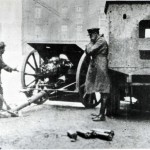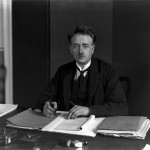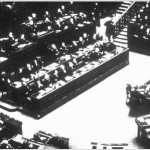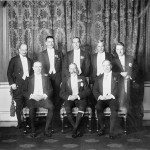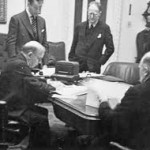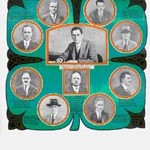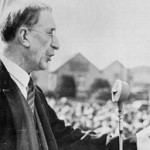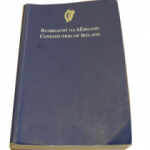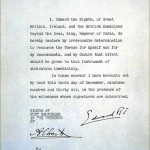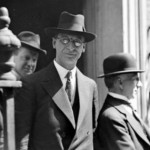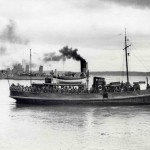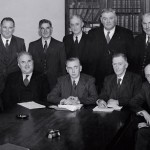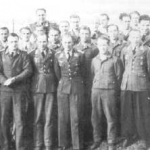Anglo-Irish Relations: 1922 – 1949
Anglo-Irish Relations:
From Free State (1922) to Republic (1949)
Relations between the Irish Free State & the United Kingdom between 1922 & 1949 underwent significant change and sometimes upheaval due to the very different views that both Dublin and London held viz-a-vis Ireland’s place within the Commonwealth.
External Relations V. Dominion Status
The origin of this relationship, the Anglo-Irish Treaty of 1921, had revealed the significant incompatibility of both Irish & British political aims. On the one hand, Dáil Eireann aimed to expand Irish sovereignty at any opportunity and worked progressively towards this aim throughout the Cosgrave & DeValera Governments of 1922 – 32 & 1932 – 1948 respectively. Britain, on the other hand, sought to ‘ring-fence’ the integrity of the Commonwealth and hold the Irish Free State within their ‘sphere of influence’ at all costs. Significant changes occurred in the relationship between Ireland & Britain over these 27 years. The following is a point-by-point analysis of the significant ‘push & pull’ factors that characterised this uneasy relationship.
___________________________________
__________________
__________________
- The Irish Civil War of 1922 – 23 was the first test of the precarious relationship between Dublin & London. While Collins’ & other Pro-Treaty leaders sought to find a compromise between themselves and Anti-Treaty Sinn Féin, London’s insistence that the Free State crush resistance to the Treaty at all costs proved to be a significant hindrance to early administration in Ireland.
- Cosgrave Government (1922 – 1932) Though the Cosgrave Government was occupied mostly by winning the Irish Civil War and stabilising the political & economic nature of the Irish Free State, they made it a policy of building the groundwork and relationships, particularly within the Imperial Conferences, to later expand Irish Sovereignty.
- League of Nations The Irish Free State joined the League of Nations in 1923 and subsequently registered the Anglo-Irish Treaty of 1921 with the League Secretariat giving it the accreditation of an international treaty between two sovereign states. This move greatly angered the British, as the perception of the Irish Free State as a sovereign & independent state was underlined in this move.
- Commonwealth Conferences. While Britain sought to re-define the colonies’ view of the British Empire by significantly increasing the apparent equality of nations through it’s Imperial Conferences, dominions such as the Irish Free State, South Africa & Canada used these very meetings to create common policies on expanding their own sovereignty & independence.
- Statute of Westminster (1931) The Statute of Westminster can be seen as a culmination of much of the progressive work done by the dominion colonies of the British Commonwealth, in which Ireland played a very significant part. This Act gave each Dominion Parliament the power to repeal any legislation of the British Commonwealth in their own parliament with regard to their own territory.
- DeValera Government (1932 – 1948) Even before DeValera’s Government came to power in 1932, much publicity had been made of the strategy of the ’empty formula’. This was DeValera’s unique way of dismissing the Oath of Allegiance as a meaningless, temporary issue which had greatly stoked the Anti-Treaty rejection of 1921 – 22. DeValera also made no secret of his intention to ‘Dismantle the Treaty’ before coming to power. Having founded ‘Fianna Fáil’ in 1926, he convinced the vast majority of Anti-Treaty Sinn Féin to join him in this new party and enter the Dáil.
- Anglo – Irish Economic War (1932 – 1938) The Anglo-Irish Economic War of 1932-38 as it became known was an effort by the Irish Government to protect Irish exports to Britain during the worst recession in modern times. Britain, like most other Western European economies was experiencing high unemployment and stagnation. In a n effort to boost their economy, Britain placed tariffs on Irish imports into Britain, particularly those of agricultural origin. DeValera responded with similar tariffs and began with-holding the Land Annuities payments which were part of the terms of the Anglo-Irish Treaty of 1921.
- Bunreacht na hEireann (1937) Having tested the waters sufficiently with the External Relations’ Act, DeValera drafted a new constitution (Bunreacht na hEireann) which became law in 1937. This new constitution declared ‘Éire’ an independent republic in all but name, with a President, Irish as the first national language and all the other characteristics of a sovereign republic laid out in detail.
- External Relations’ Act (1936) The constitutional crisis prompted by the abdication of King Edward VIII in 1936 gave DeValera the opportunity he was seeking to drastically re-define the relationship between the Irish Free State and the King of England as it’s Head of State in particular. The External Relations’ Act removed the King of England as Ireland’s Head of State in the interim and was a very deliberate precursor to the establishment of a President of Ireland (Úachtarán na hEireann) in the following year’s new constitution (Bunreacht na hEireann).
- Benevolent Neutrality (1939 – 1945) As the war progressed, DeValera qualified his claim of Ireland’s ‘Strict Neutrality’ in private to the British. He assured them Ireland would always adopt a ‘Benevolent’ view towards Britain, while maintaining their own independence. For DeValera, WWII was the ultimate test of Ireland’s new sovereignty and also of British intentions. While many tensions remained during WWII, particularly between DeValera and the US Ambassador David Gray, the British Representative in Ireland, Sir John Maffey, was central to maintaining a positive and even relationship between Ireland & the UK.
- Return of Treaty Ports (1938) While the new constitution effectively solved the legal ambiguity of the Irish State, the continued presence of British Military, particularly that of the British Navy at key ports around Ireland undermined the claim of sovereignty. With this in mind, coupled with a desire to open up Ireland’s biggest export market i.e. Britain, DeValera brought the Economic War of 1932 – 1938 to an end with an agreement to pay off the remaining land annuities in a token sum of £10 million in return for the ‘Treaty Ports’ of Spike Island (Cobh), Berehaven & Lough Swilly. With their return, the integrity of Eire’s sovereignty could be claimed without qualification. One notable opponent of this deal was Winston Churchill who foresaw the British need for these ports in a looming European conflict with Germany.
- The Republic of Ireland Act (1949)
- Emergency Powers’ Act (1939)
__________________
The Irish Civil War of 1921 – 22 was the first test of the precarious relationship between Dublin & London. While Collins’ & other Pro-Treaty leaders sought to find a compromise between themselves and Anti-Treaty Sinn Féin, London’s insistence that the Free State crush resistance to the Treaty at all costs proved to be a significant hindrance to early administration in Ireland.
While Britain sought to re-define the colonies’ view of the British Empire by significantly increasing the apparent equality of nations through it’s Imperial Conferences, dominions such as the Irish Free State, South Africa & Canada used these very meetings to create common policies on expanding their own sovereignty & independence.
The Irish Free State joined the League of Nations in 1923 and subsequently registered the Anglo-Irish Treaty of 1921 with the League Secretariat giving it the accreditation of an international treaty between two sovereign states. This move greatly angered the British, as the perception of the Irish Free State as a sovereign & independent state was underlined in this move.
__________________
__________________
Though the Cosgrave Government was occupied mostly by winning the Irish Civil War and stabilising the political & economic nature of the Irish Free State, they made it a policy of building the groundwork and relationships, particularly within the Imperial Conferences, to later expand Irish Sovereignty.
The Statute of Westminster can be seen as a culmination of much of the progressive work done by the dominion colonies of the British Commonwealth, in which Ireland played a very significant part. This Act gave each Dominion Parliament the power to repeal any legislation of the British Commonwealth in their own parliament with regard to their own territory.
___________
___________
Even before DeValera’s Government came to power in 1932, much publicity had been made of the strategy of the ’empty formula’. This was DeValera’s unique way of dismissing the Oath of Allegiance as a meaningless, temporary issue which had greatly stoked the Anti-Treaty rejection of 1921 – 22. DeValera also made no secret of his intention to ‘Dismantle the Treaty’ before coming to power. Having founded ‘Fianna Fáil’ in 1926, he convinced the vast majority of Anti-Treaty Sinn Féin to join him in this new party and enter the Dáil.
__________
__________
The Anglo-Irish Economic War of 1932-38 as it became known was an effort by the Irish Government to protect Irish exports to Britain during the worst recession in modern times. Britain, like most other Western European economies was experiencing high unemployment and stagnation. In a n effort to boost their economy, Britain placed tariffs on Irish imports into Britain, particularly those of agricultural origin. DeValera responded with similar tariffs and began with-holding the Land Annuities payments which were part of the terms of the Anglo-Irish Treaty of 1921.
_______________________________________________
_______________________________________________
The constitutional crisis prompted by the abdication of King Edward VIII in 1936 gave DeValera the opportunity he was seeking to drastically re-define the relationship between the Irish Free State and the King of England as it’s Head of State in particular. The External Relations’ Act removed the King of England as Ireland’s Head of State in the interim and was a very deliberate precursor to the establishment of a President of Ireland (Úachtarán na hEireann) in the following year’s new constitution (Bunreacht na hEireann).
____________________________
____________________________
Having tested the waters sufficiently with the External Relations’ Act, DeValera drafted a new constitution (Bunreacht na hEireann) which became law in 1937. This new constitution declared ‘Éire’ an independent republic in all but name, with a President, Irish as the first national language and all the other characteristics of a sovereign republic laid out in detail.
________________________________
________________________________
While the new constitution effectively solved the legal ambiguity of the Irish State, the continued presence of British Military, particularly that of the British Navy at key ports around Ireland undermined the claim of sovereignty. With this in mind, coupled with a desire to open up Ireland’s biggest export market i.e. Britain, DeValera brought the Economic War of 1932 – 1938 to an end with an agreement to pay off the remaining land annuities in a token sum of £10 million in return for the ‘Treaty Ports’ of Spike Island (Cobh), Berehaven & Lough Swilly. With their return, the integrity of Eire’s sovereignty could be claimed without qualification. One notable opponent of this deal was Winston Churchill who foresaw the British need for these ports in a looming European conflict with Germany.
_______________________
_______________________
With the outbreak of war in September 1939, DeValera placed all his hopes on the claim of ‘Strict Neutrality’ i.e. that Eire was non-aligned and had no interest in either side of the conflict. With the Emergency Powers’ Act of 1939, the Irish State arrested and detained anyone who might endanger the appearance of Ireland’s neutrality. This led to the detention of many IRA members, some of whom were executed in prison during the years 1939 – 1945.
As the war progressed, DeValera qualified his claim of Ireland’s ‘Strict Neutrality’ in private to the British. He assured them Ireland would always adopt a ‘Benevolent’ view towards Britain, while maintaining their own independence. For DeValera, WWII was the ultimate test of Ireland’s new
sovereignty and also of British intentions. While many tensions remained during WWII, particularly between DeValera and the US Ambassador David Gray, the British Representative in Ireland, Sir John Maffey, was central to maintaining a positive and even relationship between Ireland & the UK.

